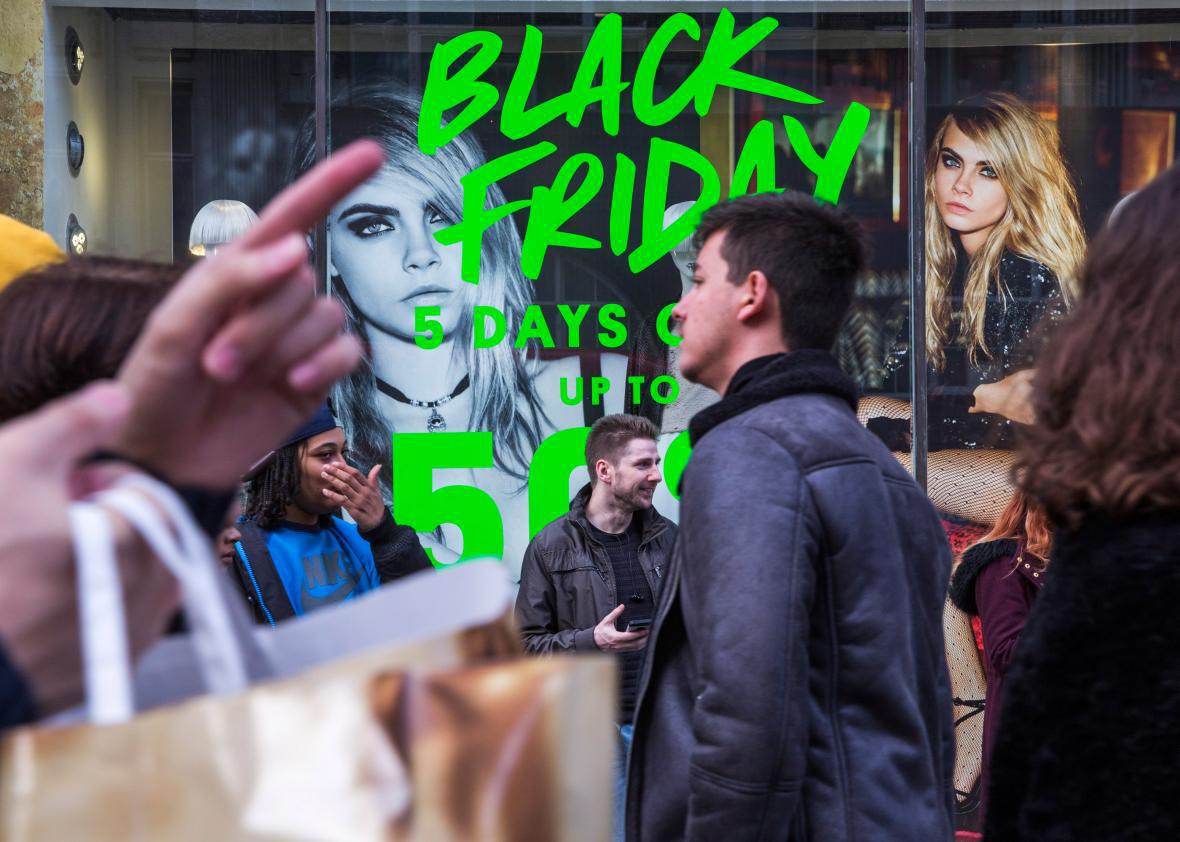Black Friday is rapidly approaching … in Great Britain. And it promises to be as full of crazed bargain-hunting shoppers as the American version. What makes this even more ridiculous? The British don’t celebrate Thanksgiving. (After all, the Pilgrims hosted the first Thanksgiving dinner after their successful exit from England.) And until recently, they didn’t celebrate Black Friday, either. Enter Amazon.
The e-commerce juggernaut first introduced Black Friday to Britain in 2010. The concept proved popular. As a result, other U.K. retailers began to offer Black Friday discounts, both online and in stores.
But it wasn’t until 2013 that the day achieved something near the legendary status in Britain that it enjoys in the States. That’s when Asda, a U.K.-based superstore owned by, yes, Walmart, began to run Black Friday promotions in its physical stores promising “earth-shattering deals” with “unbeatable” prices. The chain’s chief merchandising officer specifically cited Walmart’s Black Friday sales as an inspiration. Guess what happened next?
British consumers, who for years had thrill-watched American Black Friday shoppers on YouTube, knew exactly what to do. They mobbed the front doors of Asdas across the British isles hours before the 2013 Black Friday sales began, and then, as if on cue, began to fight over the goods when allowed inside. There were reports of a “stampede over cut-price televisions” at a Belfast, Northern Ireland, Asda, and a “scuffle” over the same product at one located near Bristol, England.
The Mirror launched a blog to report on retail mayhem, from the Leeds neighborhood of Pudsey to New York City. In a marvelous bit of British understatement, an Asda representative told the media, “Our customers were eager to take advantage of the great offers available to them. ” But from a bottom-line perspective, the day was a resounding success for Asda. The chain subsequently reported, according the Telegraph, that it sold 16,000 tablet devices in the space of 60 minutes.
Not surprisingly, even more U.K. retailers decided to join in 2014’s Black Friday sales bacchanalia. The result was predictable. What the police described as “disturbances” occurred at retailers holding sales across the country. In one store, customers were almost trampled in the rush to get deals:
At a number of Tescos, the staff called the police on their own shoppers. Reports from customers caught offguard—British Black Friday is only a few years old, after all—abounded. One Jamie Hook, who made the mistake of going supermarket shopping at a Tesco that Thursday night, told the BBC he saw “people climbing over shelves and displays, staff running for cover, fights breaking out, stock flying through air, people breaking through carrying televisions—and this was before the sale had even started.” Police futilely begged both stores and people to keep better control:
“They were scenes that shamed Britain,” the Independent recently opined.
Now, it seems, the British are stuck with Black Friday much as American retailers are—their shoppers now expect it. Some retail analysts predict customers will spend more than 1 billion pounds on combined online and in-store shopping this Friday.
Nonetheless, it’s not even clear Black Friday is a win for British or American retailers, never mind shoppers. LCP Consulting reported only a third of retail executives they surveyed in the United States and Britain claimed the shopping holiday was profitable, with another 28 percent saying it was not only a money loser, but “unsustainable.”
As for those looking for discounts, they’re likely not doing much better. The experts say more than a few items can be gotten on sale again in the days closer to Christmas. As for the too-good-to-be-true sale items? Quantity is limited and few customers actually get them. My advice, no matter what country you live in? Stay home and fire up the computer or mobile. The YouTube viewing is bound to be entertaining.
One last thing: There won’t be any Asda videos this year. The chain decided to sit this Black Friday out. It turned out all the marauding bargain hunters were scaring off the regular shoppers. “This year customers have told us loud and clear that they don’t want to be held hostage to a day or two of sales,” Asda’s CEO Andy Clarke explained.
